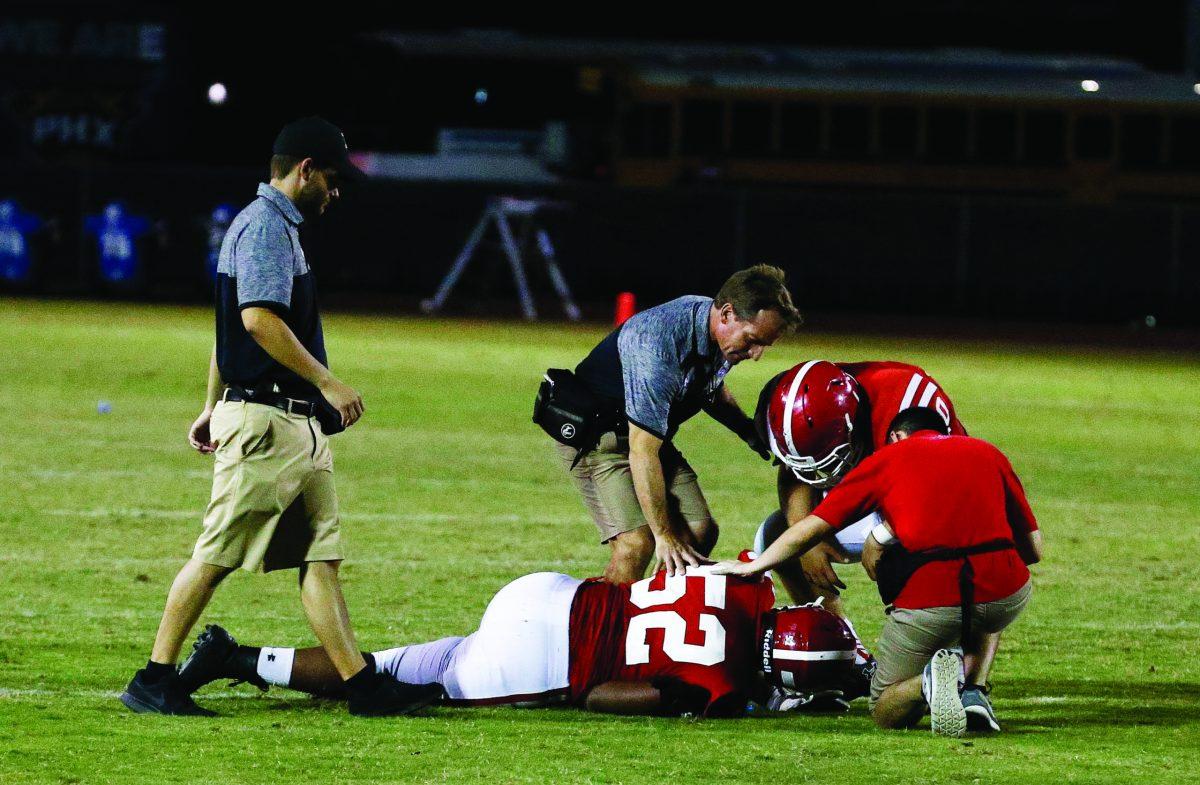Photo Illustration by Bryce Owen ’17 | Membean is a website dedicated to building vocabulary. Brophy English teachers use the website for sophomore and junior classes.
By Hayden Welty ’19
THE ROUNDUP
When it comes to educational technology in the classroom, English teachers are pioneering the use of online tools, helping customize learning to different students.
No Red Ink used differently, preceded by variety of similar grammar programs
After much experimentation, English teachers on campus use the software program No Red Ink as their grammar tool of choice.
Before NRI, Brophy used two different software programs: EnglishGrammar101.com and EGUMPP, according to English Department Chair John Damaso ’97.
EnglishGrammar101.com was not very effective: The software did not provide deep learning because it was about finding the pattern, Mr. Damaso said. You could pay very little attention and still complete the assignment.
Brophy has also utilized EGUMPP, another online grammar tool.
Mr. Damaso said it was more sophisticated, but had a more old-school approach. The user was forced to identify the part of speech of each word in every sentence.
There were also issues with the software, as EGUMPP required Microsoft Silverlight to work, but the iPad’s had some difficulty running the Microsoft-based program on its Apple-based device, according to freshman English teacher Mr. Scott Middlemist ’87 in an email interview with The Roundup.
The problem with both of these programs, according to Mr. Damaso, was that they didn’t lead to great writing, instead students learned how to memorize basic patterns and identify parts of a sentence.
The school then tried No Red Ink, which is the program still used today.
“We have students coming to Brophy from all corners of the Valley, and some have an extensive grammar background, while others have little to none,” Mr. Middlemist said. “No Red Ink allows us to reach both groups effectively, because the program insists on ‘mastery’ of a topic before a student can move on to the next topic.”
Mr. Damaso echoed the sentiment that NRI is able to customize learning.
“No Red Ink allows me to individualize the learning a little bit more, so it’s not just a one size fits all solution,” Mr. Damaso said.
“Mr. Middlemist famously calls grammar a ‘perishable’ skill that if you just put it up on a shelf eventually it’s going to rot,” Mr. Damaso said. “I really like that language.”
He said he uses No Red Ink in his English 2 and English 3 classes as a way to solidify these “perishable” grammar concepts learned in prior years.
On the other hand, Mr. Middlemist said he uses NRI in Honors English 1 as a way to teach grammar to his freshmen students.
“After teaching English for 23 years, I now use NRI extensively because strong grammar skills help students become better writers, readers and speakers,” he said.
One of his students, Keegan Spotts ’20, said NRI is beneficial.
“I think it’s very helpful, especially when you’re writing papers,” Spotts said. “It helps with some of the little things that you might not usually come across.”
Alex Ismailov ’20, another student in Mr. Middlemist’s freshmen Honors English 1 class, said he agrees that NRI is helpful.
“It really improves my writing, it helps me see grammatical errors,” Ismailov said. “… It educates you, it tells you exactly what you need to do.”
Students say Membean enriches vocabulary
Membean and Brophy continue to cultivate a partnership, as Brophy decides to expand the software to freshmen students.
“Membean is a Portland, Ore. based company, providing web based tools to help students excel at tests,” according to the company’s website, www.membean.com. “We aim to bring evidence based, well researched instruction techniques out of learning labs and into everyday use.”
Brophy was Membean’s third customer in its history, and now, Membean partners with thousands of schools across the nation, according to English Department Chair Mr. John Damaso ’97.
Mr. Damaso brought Membean to Brophy, initially using it in his English 2 classes, and eventually expanding its use to English 3 students as well. He also presented the software to other diocesan schools, and now, Membean has a contractual relationship with the Diocese of Phoenix.
Mr. Damaso said Membean and Brophy have had open, two-way communications, which has led to improvements in the software.
“The CEO there, Ragav Satish, he has been so responsive to my and our students’ ideas to how to make the software better,” Mr. Damaso said. “He counted about 10 different features that they have edited or added as a result of what Brophy has given as feedback.”
Mr. Damaso said he thinks it’s really cool that students are not only learning from Membean, but that they’re also improving it. He said he loves to see that kind of feedback loop.
Senior Alex Bhatt ’17 echoed the sentiment that the staff is cooperative.
“The administration there was very responsive and quick in their replies,” Bhatt said about his experience with Membean. “They were really helpful.”
Bhatt said that he really enjoys using the software and thinks that is a beneficial learning tool, which helped his vocab improve tremendously.
“It has made me create more cohesive arguments because I know which word is appropriate and which word is not appropriate for different syntax,” Bhatt said.
He also said that he is considering accepting an internship with the company this upcoming summer.
Spotts said that he would recommend the software to new students, and Ismailov said he uses the words he learns on a daily basis and also thinks the program is a good tool.
Before using Membean, the English department utilized flashcards to learn new vocabulary, according to Mr. Damaso.
He said he thinks that Membean is a much better system.
“Flashcards are pretty single dimension: You have a word, a meaning, and maybe a part of speech and an illustrative sentence,” Mr. Damaso said. “With Membean, you have nine different portals into a word.”
“You can look at an example quiz question, you can read a whole paragraph that uses the word in context in many different ways, you can look at synonyms and antonyms, you can watch videos, look at images,” he said. “All of that leads to more durable learning, and that’s Membean’s slogan: ‘durable learning.’”
“It’s not about that short-term cramming of knowledge, but that long-term mastery of it,” Mr. Damaso said. “… I have some guys sophomore year who will learn over 1,000 words and some guys who will learn 400, both of those are better than the 250 flashcards we used to do.”
‘Language is such a powerful tool’
Mr. Damaso said he thinks language is paramount to our development as students.
“I think language is such a powerful tool, both in spoken language and in written language; I want our students to have an advantage in the world linguistically,” he said. “Using words of different registers, more sophisticated diction, I think that is useful not only in college but in their professional life and in their relationships, honestly.”
Assistant Principal for Academic Affairs Mr. Seamus Walsh said he agrees that students’ ability to effectively use language is crucial.
“In terms of evolving our capacity as writers and readers and speakers, language is giant,” Mr. Walsh said. “It really is giant. So, from a content perspective, NRI and Membean are just evolutions of the same types of content that have always been important in an education that focuses on the whole person, and part of that being the ability to read well, to write well and to speak well.”
“Words are powerful: they have the power to harm and to bruise, they have the power to prop up and affirm,” Mr. Walsh said. “And not every Membean word obviously is going to do either of those things, but we really want to push kids to educate themselves as far as they can.”






























